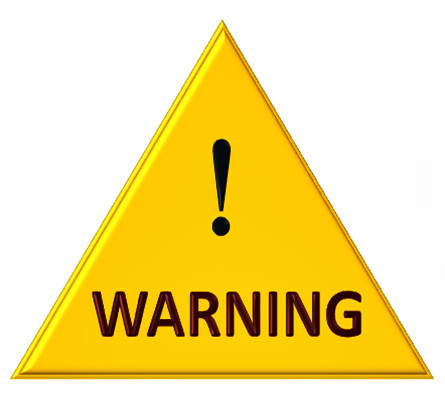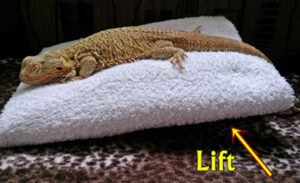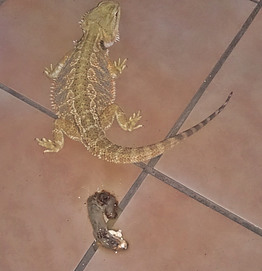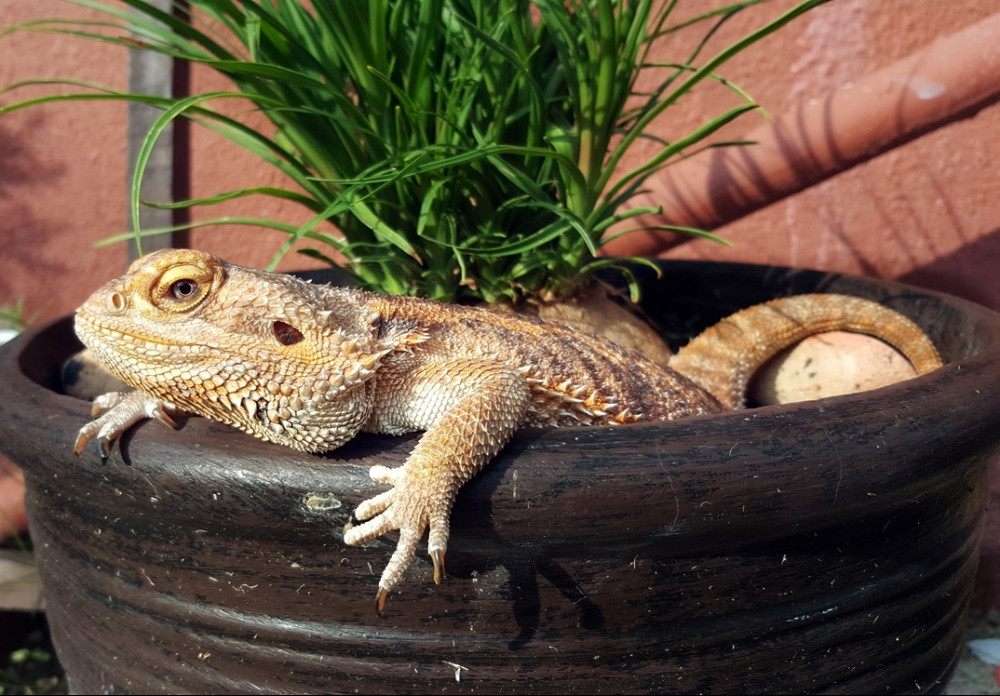Purging up food is a very bad sign and whenever your bearded dragon vomits, it should be seen as an extremely dangerous symptom. Veterinary care is a must!

Purging up for humans is nothing much because we have membranes that stop any liquid from passing into our lungs. However, a bearded dragon does not have such a membrane and fluid will go directly into their lungs causing death if not removed. A reptile vet will most likely prescribe medication that will dry up the fluid or give an injection that will expand the lungs.
If your bearded dragon has vomited, keep him/her “face down” on a cushion or rolled-up towel that is slightly elevated until you get to the vet. This will help drain out some of the fluid.

Causes for Vomiting
Sometimes bearded dragons will gulp down their food too fast and a cricket or worm might be purged out straight away. This is not harmful as long as there are not any fluids with it. However, when food is vomited out after feeding time passes (after 10 minutes), then it is a dangerous kind of purging up. To the naked eye, it might seem that the vomit does not contain fluids, but it does and pieces of it can also enter the lungs, making it even more deadly.
Sometimes bearded dragons will drink too much water, the result, of them bringing it back up. This is not harmful, but must still be avoided, as liquids can still enter the lungs. Tilt them so their face is downwards until you can place them face down on a tilted pillow or blanket. If they stand up with their faces high in the air, puffing their beards, place them under a basking light, raising the temp a few degrees. ALWAYS dry out their mouths.
If the bearded dragon does not have enough heat or basking time, they will sometimes, bring the undigested food back up, similar to a cold snake. They do this to prevent the food from rotting in their stomachs and causing them harm. Once more tilt them until it has passed, and try to find a solution to the problem. Vet care should also be an option because sometimes an illness is preventing them from digesting their foods.
Stools Urine and Diarrhea
A healthy bearded dragon poop should be solid, but still soft. A soft, watery stool could be a sign of an improper diet, internal parasites, or worms. Dragons that are stressed out will also have runny poops. In addition, food like lettuce and cucumber holds no nutritional value and can cause diarrhea. Believe it or not, but diarrhea can also be a symptom of constipation and/or impaction. The blockage prevents solids from passing, which is why you only get a watery mess.
A bearded dragon’s urine comes in the form of a white solid substrate at the end of its poop. Urinate should be white at all times, if yellow it can be a sign of dehydration. (See dehydration) Urinates that stay yellow can also be an indication of liver or kidney problems and should be attended to immediately if not improving. Reddish or rusty-colored urinates are also a good indication of parasites or worms. A vet will be needed to prescribe a parasite flush.

Green urinates, are a sign of an electrolyte imbalance that should be corrected immediately as this can cause kidney and liver problems. If you are giving your dragon electrolytes as a supplement STOP and give them lots of water to help flush their systems out. Intestinal immune care, or pro-biotic can be given afterward, to try to balance their systems out once more.
Rock-hard stools are an indicator that your dragon isn’t getting enough fluids from their diets. This usually happens with dragons that have pellets as part of their diet, as pellets work like sponges, sucking all the fluids they touch, which is why I do not recommend pellets as part of their diet. If you have given pellets, and this is the result, STOP, immediately and give them lots of water. A fluid-less diet leads to dehydration and kidney problems.
If the dragon is trying to poop, but nothing or only a few drops come out, then your dragon is definitely constipated, and it needs to be relieved at once to avoid impaction, a rather dangerous illness. See Impaction.
